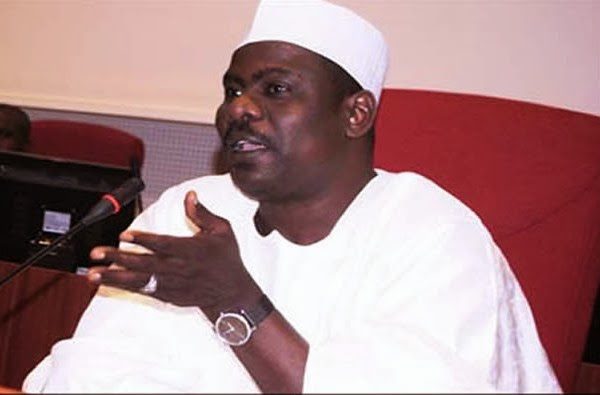Democracy & Governance
A New Sheriff Is In Town -By Ezinwanne Onwuka
Though none of the allegations was mentioned in the statement, Bawa’s suspension could not be unrelated to the role he played in the naira redesign and swap policy. Bawa had lauded the redesigning of the currency notes, saying it will curb vote buying during the 2023 general elections and corruption by targeting looted funds. He went ahead to place some then-serving governors under the commission’s watchlist and encouraged Nigerians to report anyone siphoning and hoarding banknotes for a reward.

The past three weeks have been, to say the least, turbulent. It has also been quite busy – and presumably fun – for President Bola Tinubu who is undoubtedly having a swell time discharging his duties as the chief administrator meticulously without breaking a sweat.
Before his inauguration as president on May 29, Tinubu assured time and again that he will hit the ground running as soon as he is sworn in. Many Nigerians thought he was only bluffing as is typical of politicians, but he didn’t renege on his words. Curtly, President Tinubu announced that “subsidy is gone” less than an hour after he took the oath of office. This, as we shall see, turned out to be the first of his many-to-come radical changes.
The forthright announcement of the instantaneous removal of the petrol subsidy, as expected, earned the President cheerleaders and critics, adulation and opprobrium. Nonetheless, there is almost complete unanimity by Nigerians that the long-standing subsidy era had to go, and urgently too, especially as Muhammadu Buhari, President Tinubu’s predecessor, had already set in motion the steps for a post-subsidy Nigeria – the 2023 national budget has no provision for petrol subsidy beyond June.
As debates about the removal of the petrol subsidy continued to dominate discussions on and off social media, President Tinubu gave his supporters and detractors another topic to rant about: the enactment of the access to higher education (student loan) proposal. The noble intention of the President to assent to the bill was to provide interest-free loans to indigent Nigerian students in tertiary institutions which will be recouped from the beneficiaries two years after graduation. And this was widely applauded by his henchmen who argue that the student loan would make higher education accessible, considering that the cost of education could be a significant barrier for many students.
Just as critical stakeholders, including the Academic Staff Union of Universities, ASUU, and Academic Staff Union of Polytechnics, ASUP, kicked against the legislation, a lot of Nigerians were amused at it. Besides downplaying the distressing unemployment crisis in the country and other more important issues in the education sector, especially funding, it is argued that the new Act, when implemented, would lead to a hike in fees in institutions and burden the beneficiaries with debts after graduation in a nation ridden with a high unemployment rate and poor economic policies.
Additionally, several writers, public policy analysts and columnists who have written on the controversial issue find the stipulated requirements to be considered eligible to apply for the loan mind-boggling. According to the provisions of the Student Loan Act 2023, a prospective beneficiary must provide at least two guarantors which must include a senior civil servant who is closer to retirement than entry-level, a lawyer who is either a Senior Advocate of Nigeria, SAN, or is eligible to become one, a judicial officer or justice of peace. In addition to this, there is a below-N500,000 per annum salary threshold for the parents of applicants. Undeterred by these heavy criticisms, the President is determined to begin disbursement of the loans in September for the 2023/24 academic session.
The aforementioned policies are, however, the tip of the iceberg of the many sweeping changes effected by President Tinubu since he assumed office. In keeping with his promise of reforming the financial sector, the President suspended Godwin Emefiele as the governor of the Central Bank of Nigeria, CBN, and appointed an interim governor in the person of Folashodun Shonubi, who was, hitherto, the deputy governor in charge of operations directorate. Expectedly, Shonubi will act until a substantive governor is elected or the ongoing investigation on Emefiele and the planned reforms is concluded.
Emefiele’s imminent suspension was all too glaring. The tension between the now-incarcerated CBN governor and the President had escalated since campaigning began for the presidential election that Tinubu supposedly won in February as a result of the naira redesign and currency swap policy by the Emefiele-led CBN, introduced on 26 October 2022. Tinubu has been critical of the policy and during a campaign rally hinted that the policy was made to jeopardise his chances at the polls. At his inauguration, he also condemned the policy which he said ‘was too harshly applied’, adding that ‘the policy shall be reviewed.’ Hence, the news of Emefiele’s suspension on June 9 was not surprising since he and Tinubu do not see eye to eye on the policy.
After Emefiele’s, the next suspension news that hit the media was that of the chairman of the Economic and Financial Crimes Commission, EFCC, Abdulrasheed Bawa who was directed to hand over to Abdulkarim Chukkol, the anti-graft agency’s director of operation. A statement from the Office of the Secretary to the Government of the Federation explained that Bawa’s suspension was a result of the ‘weighty allegations of abuse of office levelled against him’ and to ‘allow for proper investigation into his conduct while in office.’
Though none of the allegations was mentioned in the statement, Bawa’s suspension could not be unrelated to the role he played in the naira redesign and swap policy. Bawa had lauded the redesigning of the currency notes, saying it will curb vote buying during the 2023 general elections and corruption by targeting looted funds. He went ahead to place some then-serving governors under the commission’s watchlist and encouraged Nigerians to report anyone siphoning and hoarding banknotes for a reward.
Another major shake-up by President Tinubu was the immediate retirement of the service chiefs – a move widely anticipated as he promised to make security his optimum priority. ‘Security shall be the top priority of our administration because neither prosperity nor justice can prevail amidst insecurity and violence,’ the President said in his inaugural address. Also worthy of mention is the influence the President exerted in the emergence of Godswill Akpabio and Barau Jibrin as senate and deputy senate presidents, respectively, and Tajudeen Abass and Benjamin Kalu as speaker and deputy speaker of the House of Representatives, respectively, as well as his replacements for the sacked service chiefs. Other notable developments are the dissolution of the governing boards of all federal government parastatals, agencies, institutions, and government-owned companies, and the return of the National Emergency Management Agency, NEMA, and the National Hajj Commission of Nigeria, NAHCON, to the Office of the Vice President for supervision.
No doubt with the foregoing, one can surmise that indeed a new sheriff is in town – one who is not all bark and no bite. I believe that in the days and weeks ahead, President Tinubu will roll out more bold and more speedy changes in his quest to overhaul the nation’s economy towards driving currency stability, ameliorating corruption, curb spiralling inflation and insecurity, and boosting growth. And whether he is truly the kind of president Nigeria needs at this perilous time in our history will be very critically analysed in the coming months.
Ezinwanne writes via ezinwanne.dominion@gmail.com




















